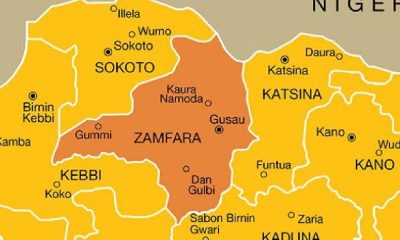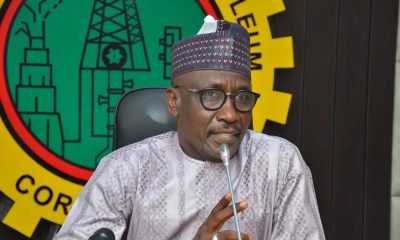Economy
Naira crude sale yet to happen – Operators

The Dangote Petroleum Refinery and other domestic refineries have yet to start the purchase of crude oil in naira as directed by President Bola Tinubu.
It was that the $20bn plant and other local refineries in Nigeria had yet to start buying crude oil from the Nigerian National Petroleum Company Limited in naira as instructed by Tinubu last week.
The Crude Oil Refiners Association of Nigeria said letters have been written to NNPC by individual refiners requesting crude, but there has been no response yet.
The Federal Executive Council recently adopted a proposal by Tinubu to sell crude to the Dangote refinery and other upcoming refineries in naira.
FEC approved that the 450,000 barrels meant for domestic consumption be offered in naira to Nigerian refineries, using the Dangote refinery as a pilot. The exchange rate will be fixed for the duration of this transaction.
However, almost one week after the announcement, the refiners said they had not heard from the NNPC.
The Publicity Secretary of the Crude Oil Refiners Association of Nigeria, Eche Idoko, said the Nigerian Midstream and Downstream Petroleum Authority is expected to kickstart the process.
“We have not started buying crude from NNPC. Individual members have written to them (NNPC) already, and they have several requests from these refineries before them.
“Typically, we would expect our regulator, in this instance, the NMDPRA, to kick start the process by calling for a meeting of all parties to discuss the framework for such supply or have NNPC respond to the various letters to it by the refineries requesting for crude,” Idoko noted.
The CORAN spokesperson had earlier stated that the supply of crude oil to local refineries in naira would bring down the cost of petrol and strengthen the naira against the dollar.
Idoko commended Tinubu for listening to the voice of indigenous refiners but noted that an executive order should be issued on the new directive.
The crude oil refiners also sought a meeting with the economic team to work out a rate that would favour the Nigerian market.
“Yes, we will see a rebound in the pricing of fuel once the President’s order is implemented. Mind you, the pronouncement alone is not enough. It must be with a force of law, either by executive order or by incorporating it into a new guideline so that the crude producers will be bound to sell to us in naira,” Idoko stated.
Dangote refinery and other domestic refiners have been complaining about the difficulties associated with accessing crude oil for their plants. Recently, the management of Dangote Group insisted that the IOCs were still frustrating crude supply to the 650,000-capacity refinery.
In a statement, the group alleged that the IOCs insisted on selling crude oil to its refinery through their foreign agents, saying the local price of crude will continue to increase because the trading arms offer cargoes at $2 to $4 per barrel, above NUPRC official price.
The group also alleged that the foreign oil producers seem to be prioritising Asian countries in selling the crude they produce in Nigeria.
A senior official at the Dangote refinery, who pleaded not to be named due to lack of authorisation to speak on the matter, confirmed that the plant had yet to start buying crude in naira from NNPC.
The spokesperson of NNPC, Olufemi Soneye, did not respond to enquiries on the matter when contacted by our correspondent.
Economy
Naira Records Marginal Decline Against Dollar at Official Market

The Nigerian naira experienced a mild drop in value on Friday, closing at ₦1,602.18 per dollar in the official foreign exchange market, based on figures released by the Central Bank of Nigeria (CBN).
This marks a decrease of ₦5.49 from the rate of ₦1,596.69 recorded on April 30, the last trading day before the May 1 Workers’ Day holiday—indicating a depreciation of approximately 0.34%.
Earlier in the week, from Monday to Wednesday, the naira remained relatively stable, exchanging at ₦1,599.95, ₦1,599.71, and ₦1,596.69 respectively.
Although the local currency showed some consistency mid-week, it wrapped up the week with a loss, following a sligh dip of 0.02% at the beginning of the week
Economy
Black Market Dollar hits N1,610 Amid Economic quagmire

What is the Dollar to Naira Exchange Rate in the Black Market (Also Known as the Parallel Market or Aboki FX)?
Below is the black market exchange rate for the U.S. dollar to the Nigerian naira as of Thursday, May 1, 2025. These are the typical rates at which you can exchange dollars for naira:
Dollar to Naira Black Market Exchange Rate (May 1, 2025):
At the Lagos Parallel Market, also referred to as the black market, Bureau De Change (BDC) operators are buying dollars at ₦1,602 and selling at ₦1,610, according to market sources.
Please note: The Central Bank of Nigeria (CBN) does not recognize or endorse transactions conducted on the parallel market. The CBN advises individuals and businesses seeking foreign exchange to use official banking channels.
Economy
Naira nosedives to N1,615/$ in parallel market

The naira depreciated to N1, 615 per dollar in the parallel market from N1,610 per dollar on Monday.
Likewise, the Naira depreciated to N1,602 per dollar in the Nigerian Foreign Exchange Market (NFEM).
Data published by the Central Bank of Nigeria, CBN, showed that the indicative exchange rate for the naira rose to N1,602 per dollar from N1,596 per dollar on Monday, indicating N6 depreciation for the naira.
Consequently, the margin between the parallel market and NFEM rate narrowed to N13 per dollar from N14 per dollar on Monday.
-

 News21 hours ago
News21 hours agoFive Asian countries Nigerians can visit without a visa
-

 Entertainment22 hours ago
Entertainment22 hours agoOld Prophecy Of Pastor About VeryDarkman Goes Viral After His Arrest
-

 News22 hours ago
News22 hours agoInsecurity! Bandits abduct 25 female wedding guests
-

 News21 hours ago
News21 hours agoTompolo Launches Door-to-Door Campaign for Tinubu’s 2027 Re-Election!
-

 News21 hours ago
News21 hours agoEzekwesili slams political establishment over harassment allegation, defends Natasha
-

 News9 hours ago
News9 hours agoFormer Plateau deputy governor is dead
-

 News15 hours ago
News15 hours agoINTERPOL uncovers 150 stolen vehicles from Canada in Nigeria, Gambia, other W.A. countries
-

 News22 hours ago
News22 hours agoKyari breaks silence: “I’m not in EFCC custody, I served God, country, not corruption”




